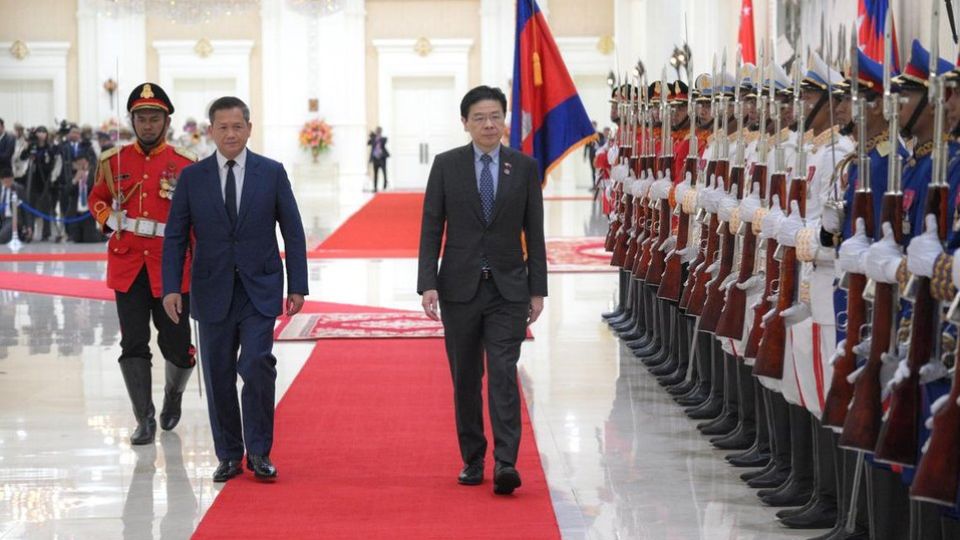July 3, 2025
SINGAPORE – Singapore and Cambodia will deepen their collaboration in several areas, including renewable energy, high-quality carbon credits and trade in food products, as the two countries mark 60 years of diplomatic relations.
Prime Minister Lawrence Wong said this on July 2 in the Cambodian capital of Phnom Penh, the latest in his series of introductory visits to Asean capitals.
At a luncheon hosted by Cambodian Prime Minister Hun Manet at the Peace Palace, PM Wong thanked Mr Manet for his invitation to visit and said the two countries’ relationship had continued to grow from strength to strength over the last 60 years.
“Our ties… were built on the strong foundation laid by then Prime Minister Lee Kuan Yew and His Majesty King-Father Norodom Sihanouk,” PM Wong said in a toast speech. “It is a foundation of mutual respect, trust and friendship that continues to guide our relationship today.”
Singapore is one of Cambodia’s largest investors and trading partners, he noted. In 2024, the Republic was Cambodia’s third-largest foreign investor, with bilateral trade between the countries increasing 7.1 per cent year on year to $4.83 billion.
During his one-day visit – which PM Wong said was “short but meaningful” – he called on Cambodian King Norodom Sihamoni at the Royal Palace. He also called on Senate President Hun Sen.
At his meeting with Mr Manet, the two leaders reaffirmed the excellent ties between the two countries, and agreed on the importance of deepening bilateral cooperation across various sectors, Singapore’s Ministry of Foreign Affairs (MFA) said in a statement.
Among the priority areas of cooperation they agreed on was renewable energy, where the two countries working together can help build a greener and more interconnected Asean, said PM Wong.
He cited a project for Singapore to import 1GW of low-carbon electricity from Cambodia which will be a key building block towards an Asean Power Grid.
The plan is for the grid to link up the electricity networks of the group’s member countries and enable cross-border power trading by 2045.
Some progress has already been made on this front, with Singapore’s Keppel having inked a pact in 2023 with Cambodia’s Royal Group Power for the long-term import and sale of 1GW of low-carbon electricity.
In the area of high-quality carbon credits, the countries are working together on an implementation agreement that builds on an earlier memorandum of understanding.
“This will mobilise financing for clean-energy projects, uplift rural communities and improve livelihoods, while enabling both our countries to hit our net-zero goals,” said PM Wong.
With Cambodia being a key agricultural exporter and Singapore importing almost all its food, the two countries will also deepen their cooperation in this field.
“We are also keen to diversify our sources of food imports, so closer collaboration in this area will be mutually beneficial for both our countries,” said PM Wong.
Both countries also agreed to continue working to strengthen Asean centrality and unity, to keep the grouping relevant and advance the region’s collective interests.
“In this uncertain global environment, it is more important than ever for Asean to stay cohesive, uphold open channels of dialogue, and work together to resolve our differences peacefully,” said PM Wong.
He added that Singapore and Cambodia continue to be steadfast partners in human development, with nearly 19,000 Cambodian officials having received training in areas like public health, digital governance and public administration under the Singapore Cooperation Programme (SCP).
Much of this training is conducted right in Phnom Penh at the Cambodia-Singapore Cooperation Centre, noted PM Wong.
The centre is one of three Singapore Cooperation Centres that the SCP has been operating since the Initiative for Asean Integration was launched under Singapore’s chairmanship of Asean in 2000. The other centres are in Laos and Vietnam.
In his meetings with Cambodia’s leaders, PM Wong expressed concern about recent developments at the Cambodia-Thailand border and encouraged both sides to resolve the matter peacefully and amicably, in line with the spirit of Asean solidarity.
He also expressed hope that both sides will de-escalate tensions, engage constructively, and reach an amicable solution that upholds international law and the broader stability of the region, said MFA.
Given today’s uncertain global environment, Asean countries cannot afford to let disputes be a source of division, PM Wong said in a social media post at the close of his visit.
“It is in our collective interest to work together to preserve peace, strengthen regional stability, and deepen Asean integration,” he said. “Thank you once again to Cambodia for the warm hospitality!”
In his toast speech, PM Wong said Cambodia has made remarkable strides over the past six decades to transform from a post-conflict society to a rapidly developing nation, and that under Mr Manet’s leadership it has charted an ambitious strategy to become a high-income nation by 2050.
“Singapore will continue to walk alongside Cambodia in this development journey,” he said.
He added: “I am confident that with Prime Minister Manet’s support and leadership, we will continue to deepen our bilateral partnership and expand our cooperation for win-win outcomes, and deliver meaningful benefits for both our people.”


